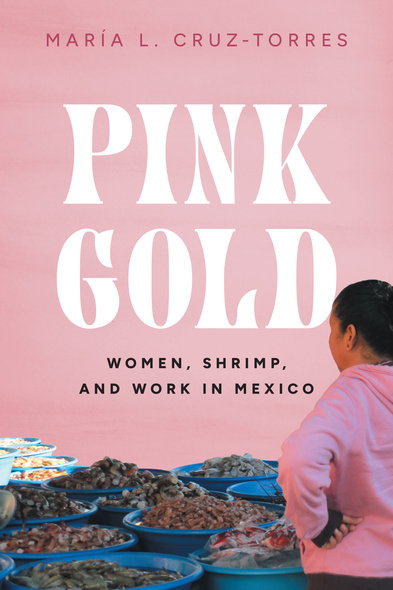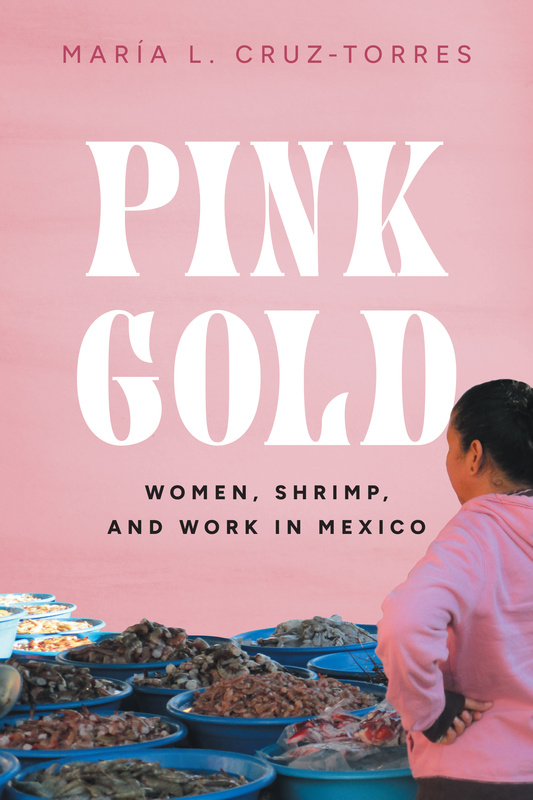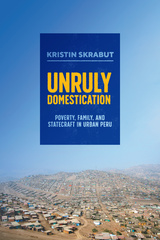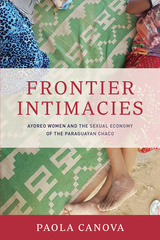
A rich, long-term ethnography of women seafood traders in Mexico.
The "shrimp ladies," locally known as changueras in southern Sinaloa, Mexico, sell seafood in open-air markets, forming an extralegal but key part of the economy built around this "pink gold.” Over time, they struggled to evolve from marginalized peddlers to local icons depicted in popular culture, even as they continue to work at an open-air street market.
Pink Gold documents the shrimp traders' resilience and resourcefulness, from their early conflicts with the city, state, and federal authorities and forming a union, to carving out a physical space for a seafood market, and even engaging in conflicts with the Mexican military. Drawing from her two decades of fieldwork, María L. Cruz-Torres explores the inspiring narrative of this overlooked group of women involving grassroots politics, trans-border and familial networking, debt and informal economic practices, personal sacrifices, and simple courage. She argues that, amid intense economic competition, their success relies on group solidarity that creates interlocking networks of mutual trust, or confianza, that in turn enable them to cross social and political boundaries that would typically be closed to them. Ultimately, Pink Gold offers fresh insights into issues of gender and labor, urban public space, the street economy, commodities, and globalization.
Pink Gold is a splendid narrative about how a Mexican underclass, the subaltern Changueras of Mazatlán, forged a union and created a market based on a local commodity, local social processes, and public space. Pink Gold refers to the commodity 'shrimp,' but it also embodies the women changueras (shrimp vendors) who persevered despite global and neoliberal processes impinging on their livelihoods. . . . Perhaps the most enduring aspect of Pink Gold is the heart underlying the social science, as evident in the descriptive elegance in tales of these women. Pink Gold is full of corazón and care. It is a tribute to the changueras, but also the work of María L. Cruz-Torres.
Through a close understanding of the lives of these women, Cruz-Torres addresses interconnections between gender and labour as well as the politics of resistance and survival in an industry traditionally understood as male-dominated....provides a valuable account of women’s participation in informal economies in the Global South....This work [is] both original and ground-breaking.
In this beautifully written ethnography based on years of research, Cruz-Torres vividly portrays the agency of changueras, women shrimp vendors who created a niche within a male-dominated world and helped shape Mazatlán as a key node in the globalized seafood market. Pink Gold makes original interventions to multiple scholarly fields and illuminates these women’s informal labor as well as their historic collective advocacy.
Through meticulous fieldwork and a robust theoretical basis in feminist political ecology, Cruz-Torres tells the story of the changueras, women shrimp vendors of Mazatlán, capturing the rich specificities of their lives and demonstrating the relevance of her case study to other similar work. She expands political ecology beyond the study of production, and helps us see the ways in which women contribute to fishing economies, even when they are not the fishers. Her strong relationships with and respect and admiration for her interlocutors are apparent on every page. Pink Gold is an outstanding book, notable for its intricate details, in-depth analysis, and warmth of spirit.
The pinnacle of social-cultural anthropology is understanding and expressing people’s lives, moving through time and set in wider contexts. Pink Gold excels in this challenging task. Women’s stories unfold from their childhoods through their full formation as seafood traders in the political ecology of coastal Mexico. Vivid, readable, touching, and memorable, this book is an outstanding ethnography.
María L. Cruz-Torres is an anthropologist and associate professor at Arizona State University's School of Transborder Studies. She is a coeditor of Gender and Sustainability: Lessons from Asia and Latin America and the author of Lives of Dust and Water: An Anthropology of Change and Resistance in Northwestern Mexico.
- Preface
- Acknowledgments
- Introduction: Amber Sunsets and Pink Gold
- Chapter 1. Contested Grounds: Women Shrimp Traders and Street Economies
- Chapter 2. On Becoming Changueras: Gendered Livelihoods and Contested Identities
- Chapter 3. The Street of the Women Shrimp Traders: Learning the Tricks of the Trade in Space and Place
- Chapter 4. Here We Are Like a Family: The Complexity of Social Relations
- Chapter 5. The Culture and Economy of Pink Gold: The Meanings, Processes, and Values of Shrimp
- Chapter 6. Sometimes We Work Just to Pay Our Debts: Informal Credit and Savings Systems
- Chapter 7. From Outcasts to Icons: Women Shrimp Traders and Expressive Culture
- Conclusion: Feminist Political Ecology, Ethnography, and Uncovering Lived Realities
- References
- Index











